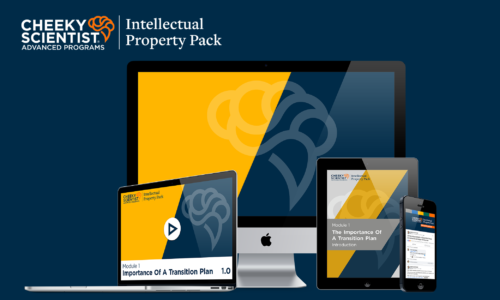
Get Hired Into A High-Paying Position As A Defender Of Innovation
Introducing the Intellectual Property Career Library By Cheeky Scientist
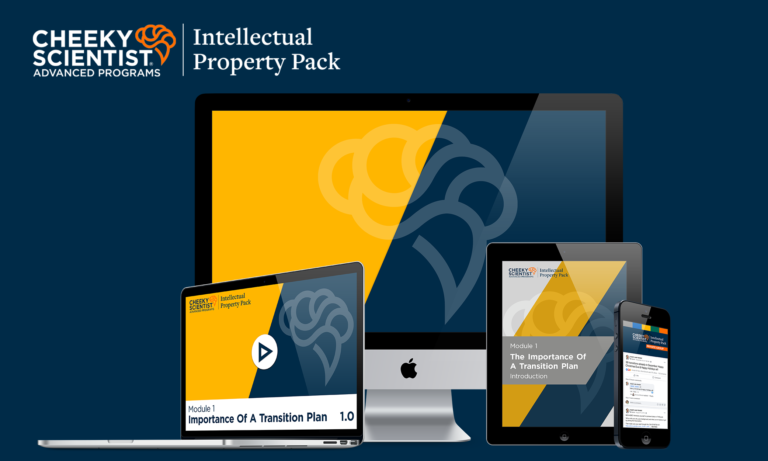
Intellectual Property Career Library
Take Action To Become A Cheeky Scientist Association Diamond Member And Get Hired As A Patent Agent Or Other Positions Related To Intellectual Property!
Here's What You Get Immediate Access To When You Join the Cheeky Scientist Association Diamond Program...
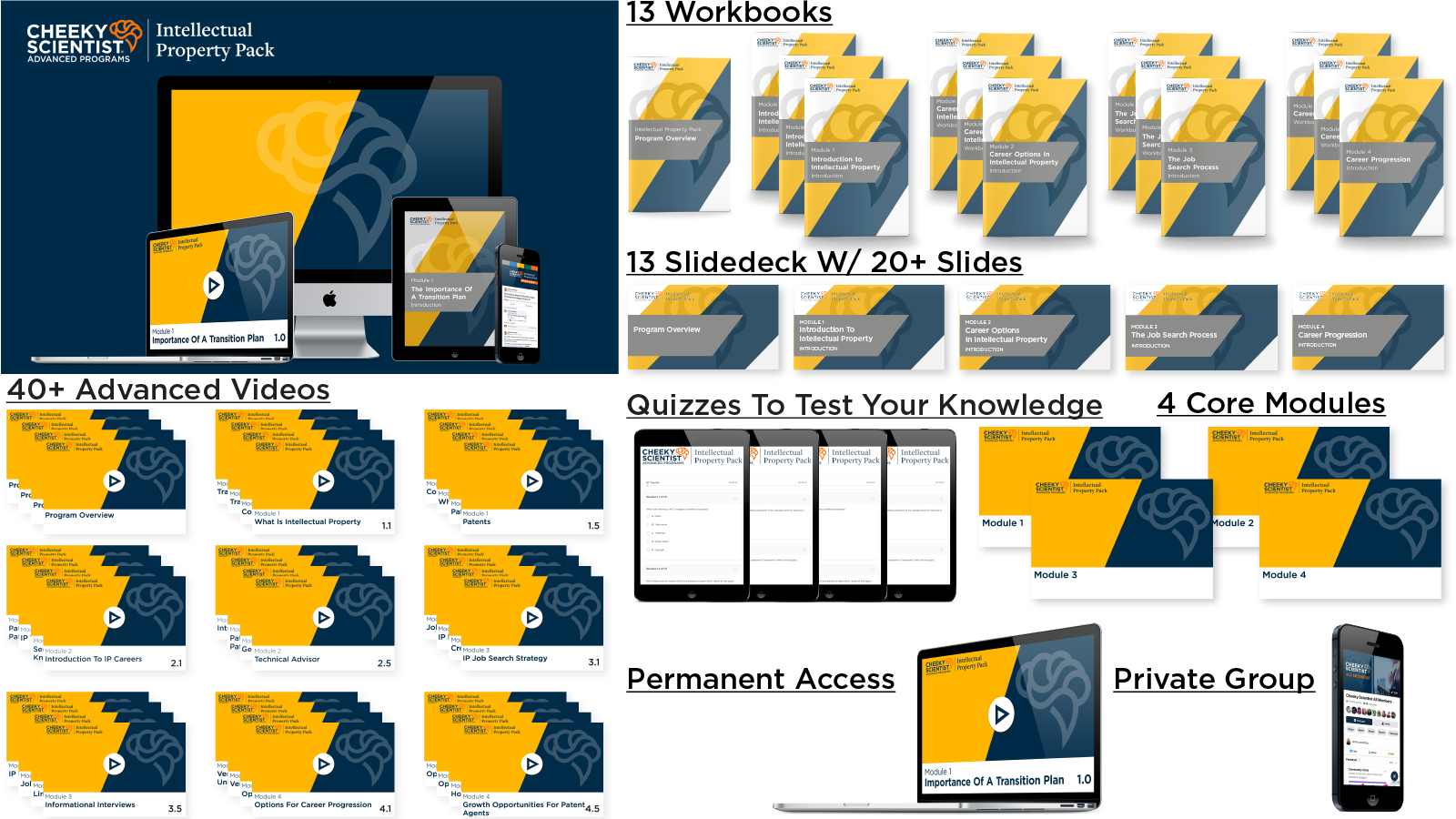

“The Intellectual Property Career Library is a very informative Advanced Program by Cheeky Scientist, who has a long track record of mentoring PhDs on top industry careers. Careers like Patent Scientist/Engineer and Patent Agent, as well as Tech Transfer and Tech Advisors, and other careers requiring acumen in regulatory, legal, and innovative matters, are expanding rapidly and PhDs are highly sought after for these roles. The Intellectual Property Career Library will connect you with other PhDs in these kinds of intellectual property careers and mentor you on how to get hired and thrive in these careers.”

“The Intellectual Property Career Library gives an excellent overview of the most common intellectual property career trajectories relevant to PhDs, including a clear articulation of the differences between roles that may appear indistinguishable to those new to the field. It shows the impact that additional education and qualifications can have on job responsibility, promotions, and pay. The program’s last module is exceptional for showing how the experience developed in an IP career relates to the larger business ecosystem and indicates how PhDs can leverage the experience they gain from working in IP to pivot their careers or start a new venture.”
The Intellectual Property Career Library
Is Designed for PhDs Who Want To…
- Transition into a growing field that values professionals who understand technical inventions and appreciate the need to protect intellectual property (IP) rights.
- Use research and analysis experience to determine how to manage IP claims.
- Learn IP law and the types of products it covers.
- Get familiar with the different types of IP and how they differ from each other so you can impress future employers.
- Know how to communicate with clients and coworkers to devise strategies for obtaining IP rights nationally and internationally
- Apply your attention to detail and time management in an influential role at the interface of law and innovation.
- Learn what the IP hiring process looks like and how to articulate the value of your PhD experience in the language of the IP industry.
Average Salary Of A Patent Agent In Industry Worldwide
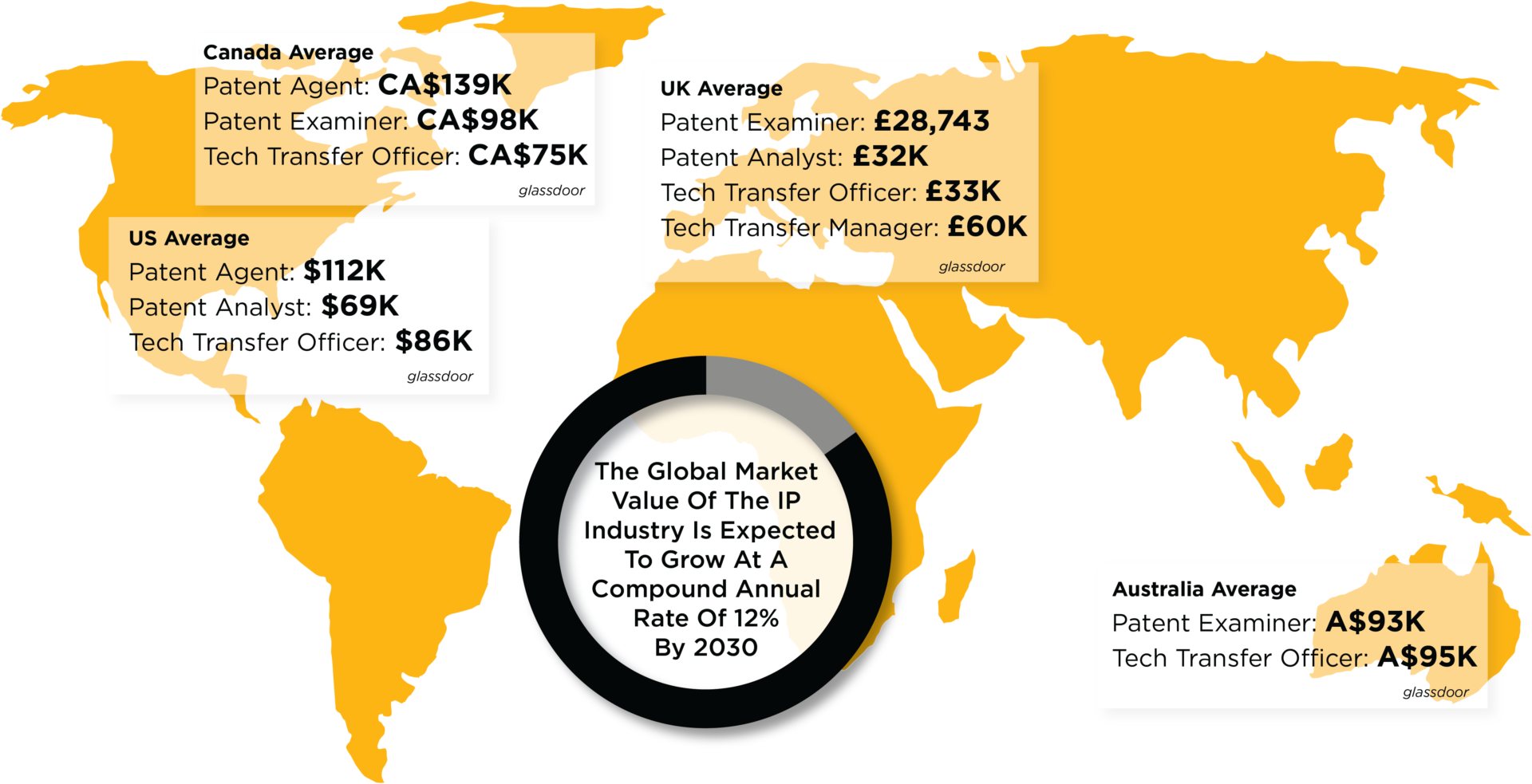

“I wish I would have the Intellectual Property Career Library by CSA back in 2015 when I decided to pursue a career in IP. Back then, I thought that there were just two types of IP professionals: those that drafted patents and those that examined them. I found myself not eligible for either of the roles and at some point just gave up and entered a management school to get a master's degree in project management. Luckily, later on a chance helped me to get back to an IP career path, outside of the two roles I'd identified in the beginning. With the Intellectual Property Career Library you will have a detailed overview of all the roles implicated in the patent prosecution as well as a large family of IP-related roles. The program also talks about the requirements that each of the positions has and gives detailed information on what you can expect from a job search in Intellectual property.”

“The materials contained in the Intellectual Property Career Library provide a lot of useful information for PhDs wanting to explore what the IP field has to offer. Members of Cheeky Scientist will find a good summary of transferable qualities useful in an IP career, a detailed layout of the different levels of IP positions at an IP firm and the scope of their daily tasks, and a map of different possible progression vertically and horizontally. Altogether, these materials will help PhDs set up a job search in the IP sector and make informed decisions about their careers once they land their first IP role. The Intellectual Property Career Library will help me in my own career goal-setting.”
IP Professionals Are In Demand And Well Compensated…
- Employment opportunities in IP are projected to grow 5.6% through 2024 due to the increasing pace of technology development (Insight Into Diversity).
- The global market value of the IP industry is expected to grow at a compound annual rate of 12% through 2030 (Transparency Market Research).
- In the USA, the average salary for a patent analyst is $69,000. This average for a patent agent is $112,000 (Glassdoor).
- There are over 600,000 patent applications across the globe currently waiting to be examined (United States Patent And Trademark Office).
- Around 15,000,000 patents are in force worldwide (World Intellectual Property Organization).
The Demand For Patent Agents Is High, And You Don’t Need A Law Degree to Get Hired. You Just Need Your PhD…
Your knowledge—or lack thereof—will play a key role in your job search in the Intellectual Property field.
You may have a PhD, and you may understand that breaking into the field doesn’t begin with resumes.
But you need to increase your business acumen and showcase specific qualities to convince employers you have what it takes to work with patents and other types of Intellectual Property.
Even though demand in this field is high, you’ll need to master certain concepts to edge out your competitors and land your first industry position.

If You’re A PhD Looking To Transition Into Industry, See If You Answer YES To These Questions…
- Do you want to define the property lines of the latest inventions?
- Do you want to work in a secure and high-paying role assessing a variety of cutting-edge technologies?
- Do you want to communicate with clients, IP team members, and regulatory agencies to secure inventors’ rights?
- Do you want to use your technical expertise and business acumen to help various stakeholders understand how following your advice will encourage future investment in research and development as well as technological progress?
- Do you want to play an influential role at the interface of innovation, law, and business?
- Do you want to work within an IP team to defend the value of inventions in the global marketplace?
Intellectual Property Professionals Form An Exclusive Group
IP professionals earn fantastic pay, enjoy professional autonomy, and influence the landscape of innovation.
But these are privileges that they’ve earned.
Members of this group speak their own language.
They know how to assess an invention compared to current technologies to determine its patentability.
IP professionals use their technical expertise and knowledge of IP law to define the legal protection of new and existing products. Their work protects inventors’ investments in technological development and promotes innovation.
If you want to increase your chances of entering the IP industry, you can’t apply to these positions blindly.
You need detailed information on your future position. During a job search, you can’t afford to show you don’t understand the basics of IP law and how it applies to emerging technologies. You can’t risk revealing that you don’t know the legal and business implications of a poorly defined invention boundary or a weak IP application strategy.
To avoid blunders like these, you’ll want to know what a typical day looks like for an IP professional.

Once You’re An IP Professional, You’ll Experience A Stunning Amount of Responsibility, Opportunities, And Professional Respect
When you envision using your PhD education, you probably think of a job with several key qualities: responsibility, professional respect, personal autonomy…
Those are some of the reasons you’re attracted to an IP career, but here’s something that’s just as important:
These opportunities aren’t confined to playing a defining role on determining which inventions end up being patented.
Becoming an IP professional can also provide incredible financial opportunity.
If you’re currently conducting postdoc work, this can seem too good to be true…
After all, you’re used to earning a salary far beneath your education.
The median household income is $61,937 (U.S. Census Bureau).
But even though you have a PhD, you probably earn well below that figure.
The national average for postdoc positions is $48,759 (Glassdoor).
But when you become an IP professional, you will be among the most sought-after professionals in the legal and technology industries, with financial opportunities you’ve never known before.
The average annual salary for an entry-level patent examiner in the U.S is $69,053 (PayScale).
And don’t forget that this salary is for PhDs just getting started in the IP industry.
Patent lawyers, the top professionals in the IP field, earn $137,312 on average in the U.S.
Additionally, positions in IP are among the most influential of PhD-level roles since they protect inventors’ rights and promote innovation across a range of technical sectors.
Once you break into the IP industry, you’ll have the opportunity to climb the IP career ladder with the support of your employer, transition into a rewarding IP-related role, or even found your own company/private practice.
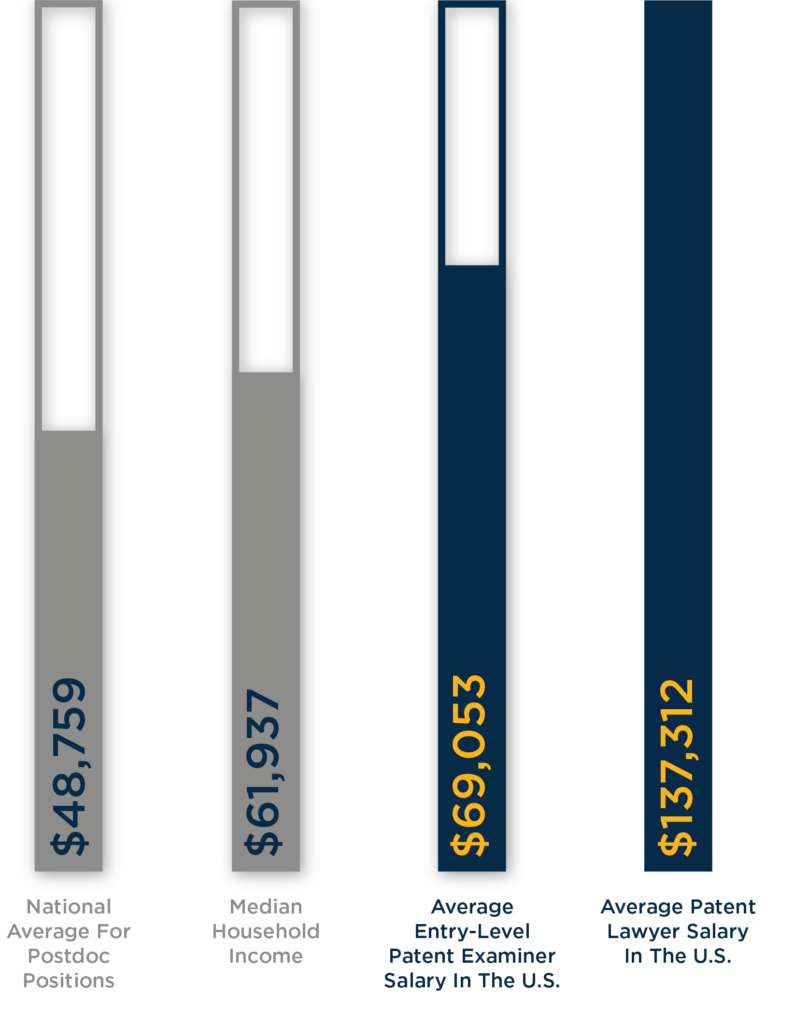
3 Important Reasons To Join The Association’s Diamond Program
- You Want To Play An Active Role In Defining The Boundaries Of New Technologies. IP professionals research existing products and technologies to determine how to differentiate an invention in an IP application. Thus, they play an essential role in defining what does and does not qualify as an IP claim.
- You Want To Defend Inventions Across Sectors. Companies in many technology sectors often invest substantial resources to enable the creation of new products. Your work as an IP professional obtaining and protecting IP on these products helps ensure a financial return for investments in innovation.
- You Want To Apply Your Experience In Innovation To The Legal Sector. Because of your PhD experience working on the front lines of innovation, your coworkers in the IP industry will value your assessment of an invention. Your IP team will depend on your insights to devise IP strategies and make legal decisions.
The Intellectual Property Career Library Can Pay For Itself In 3 Days Or Less Once You’re Hired.
A Patent Agent Position Has You Earning Over $2,000 A Week And Over $300 A Day…
If joining the Association’s Diamond Program puts you in the field even one week faster, the investment will have been well worth it.
After that one payment, you have access to the Intellectual Property Career Library for life, and if you secure your position, you can share your insights with other PhDs like you.
The Intellectual Property Career Library Includes Board Validation Given By Fellow PhDs Working In IP Positions
The Intellectual Property Career Library was created and is maintained by a board of intellectual property professionals.
As such, each module includes a board-reviewed exam, and once you pass all exams, you will receive validation from our board.
The Intellectual Property Career Library Mission
In the Intellectual Property Career Library, we’re committed to supporting you on your journey to landing a top IP position.
To achieve our goal, we’ve provided advanced, actionable strategies for success. Our program includes extensive mentoring from practicing IP industry professionals, current IP-targeted resume templates, and an intimate group of leading and aspiring PhD-level IP professionals to support your transition.
We understand why you want to break into this industry.
You want to use your technical expertise to assess inventions’ distinguishing features in the global marketplace.
You want to work with a variety of IP stakeholders, manage multiple IP projects simultaneously, and serve as a defender of inventors’ rights.
You want to protect inventions so that the world knows that the creation of a valuable new product is rewarded.
But here’s the reality…
Just because this field is growing doesn’t mean it isn’t competitive.
Frankly, you’re going to need more than a cursory knowledge of the IP industry to make the best impression with your future employer.
We can help you do just that.
The information we’re providing—from informative videos to resumes—is laser-targeted for IP positions and is exclusively for PhDs.
There are nuances to the IP industry that you will find nowhere else.
The Intellectual Property Career Library was built by practicing IP professionals who are familiar with these nuances. They can provide you with tools and advice on how best to secure a position.
To win over your future IP employer, you will want to demonstrate that you are an expert in IP law, understand the goals of the organization, and can combine your technical expertise with business acumen to devise a winning IP strategy.
You don’t need to pay thousands of dollars to understand what your employer is looking for.
In the Intellectual Property Career Library, we provide extensive mentoring and personalized support. And our materials are specifically designed to help you showcase both your natural talents and your PhD expertise so you attract the attention of top companies.
The Intellectual Property Career Library Is A Group Of Practicing Intellectual Property Professionals And PhDs Like You
Our exclusive group is private and provides a number of Intellectual Property mentors, ensuring who can provide personalized guidance.
The career library is hyper-focused and the private group will support and prepare you for the unknowns of interviewing for an Intellectual Property position.
In the private group, top patent agents currently working in industry are committed to providing a high-level of service within this intimate community.
This means you’ll enjoy a high ratio of mentors to members in this program.
You’ll appreciate how the Intellectual Property Career Library PP is designed to provide personalized guidance and swift feedback.
Your PhD has given you the academic background that’s critical for securing these jobs.
But the Intellectual Property Career Library can help you prove that fact to employers.
We’ll give you information that’s uniquely relevant to the intellectual property position – not project management, research and development, or any other field.
The result is intensive, concentrated guidance that reveals how to integrate your academic background, your transferable experience, and your knowledge of the patent agent position into behaviors that will help you land a position.
When You Join The Association’s Diamond Program, You’re Joining A Program Designed Around Knowledge That Helped Other PhDs Land Their Intellectual Property Jobs
The Intellectual Property Career Library was built on tried-and-true principles that other current Intellectual Property Professionals used to land their positions.
It’s a program that is also run by Intellectual Property professionals who’ve landed industry positions and know what experience you’ll need to leverage to improve your chances of being hired.
On top of that, the things you’ll learn in the Intellectual Property Career Library were those that other PhDs just like you used to land their first Intellectual Property position to help the most innovative products reach the market while having the protection they deserve.
Now that these Intellectual Property Professionals have used their experience to successfully transition into industry, they can look back on what helped them secure their Intellectual Property job.

Imagine Walking Into Your First IP Interview, But You Don’t Know…
- The differences between copyrights, trademarks, trade secrets, and patents. As a result, you make statements that reveal you have little knowledge of the IP industry.
- IP professions and the tasks each is legally authorized to perform. You know only the most basic information about the IP industry, and the questions you ask during the phone screen show it.
- The criteria IP employers are using to assess you during interviews. As a result, you feel awkward and uncertain as you respond when an employer asks you about your experience researching prior art.
The Intellectual Property Group Provides Targeted Support
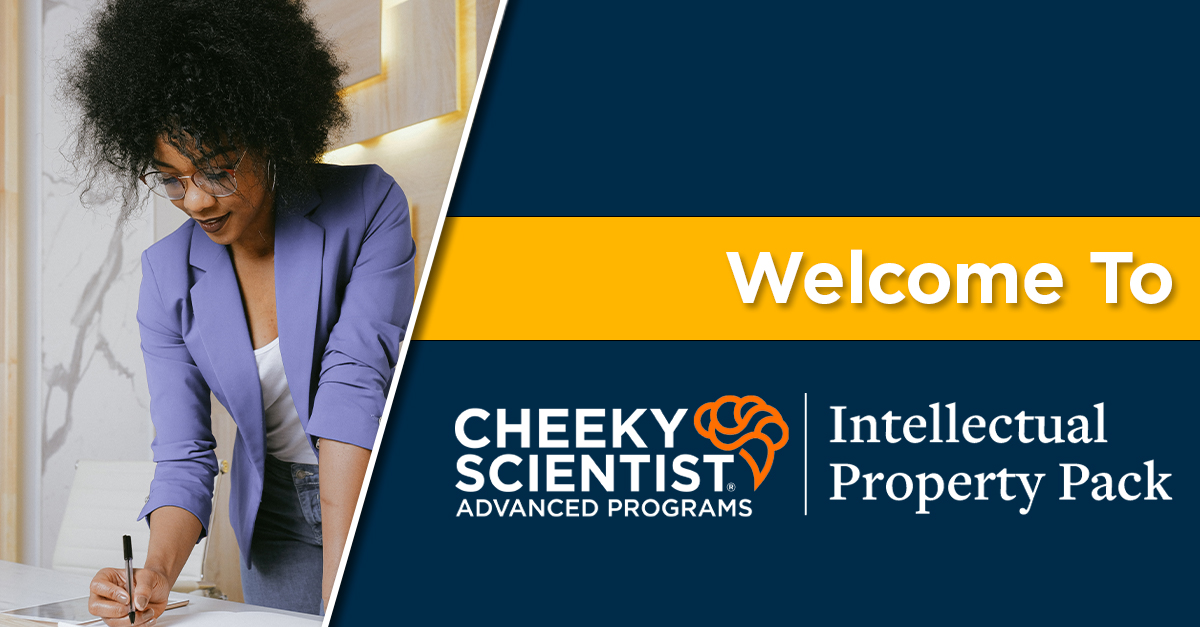
Joining the Association’s Diamond Program lets you tap into targeted support from the Intellectual Property Professionals who oversee the program and former students who’ve now landed Patent Agent and toner positions.
In the privacy of the online group, you’ll be able to ask questions about your resume, gain insights into interview experiences from transitioned patent agents, and interact with like-minded PhDs. That means you can engage in conversations on questions, topics, and challenges relevant to the Intellectual Property field.
This group is also exclusive. Only Cheeky Scientist members can see and respond to the messages in the private group.
The exclusivity of the group allows you to freely share ideas with fellow PhDs, request referrals from other patent agents, and get the advice you need when you encounter challenges.
You’ll get immediate access to a top global patent agent network exclusively for PhDs once you join…
Here’s the Targeted Mentoring You’ll Receive From The Intellectual Property Career Library…
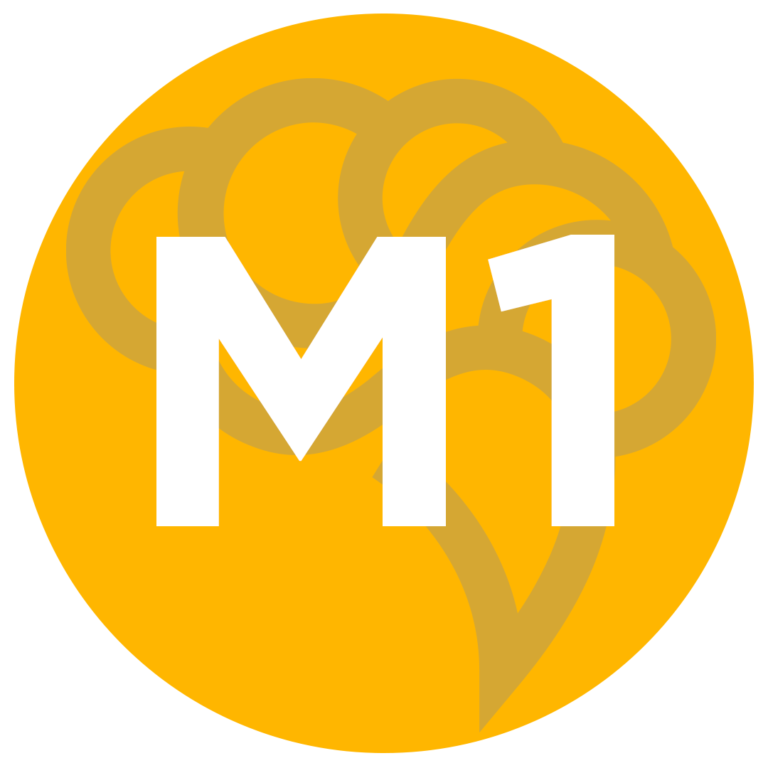
Module #1
Introduction To Intellectual Property
You know you want to become an IP professional. To make this transition, you’ll need to understand how IP works. This module covers…
- What IP is. This module defines IP and inventors’ rights. You’ll discover how IP compares with material property and why there is an increasing demand for PhDs to enter the IP industry.
- Types of IP. You’ll learn about the four different types of IP and the kinds of products each can protect. This module also outlines the processes involved in obtaining and legally protecting IP.
- Patents And Patent Law. In this module, you’ll delve into the world of patents – the form of IP that covers technical inventions. You’ll learn the requirements that a new product must meet to secure a patent, the steps involved in the patent application process, how patent infringement is defined, and more.
- IP In The Global Domain. Special mechanisms exist for navigating the international variation in IP law to protect IP in the global public domain. You’ll find out about some of the main institutions that govern international IP law to promote innovation.
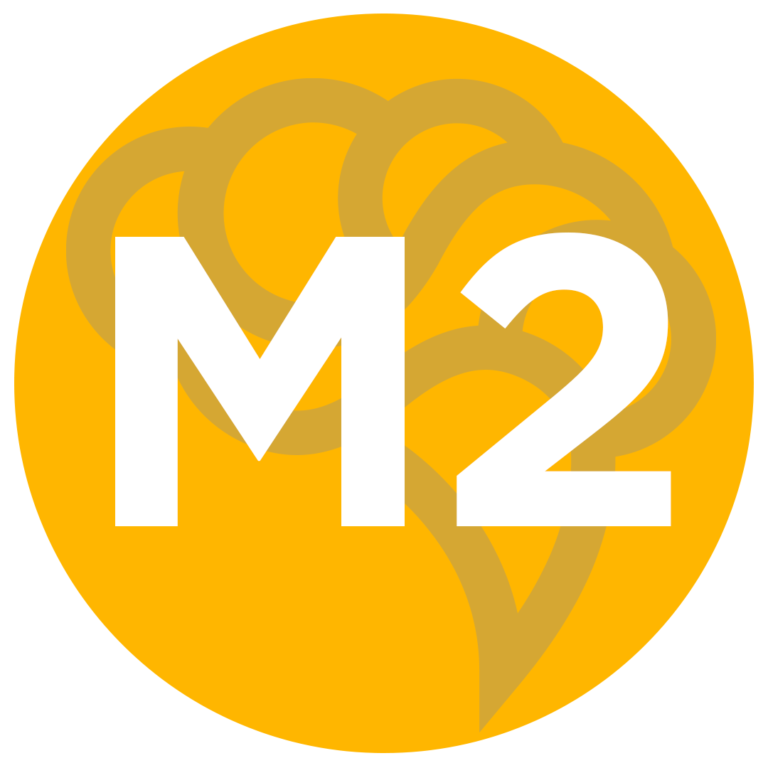
Module #2
Career Options In Intellectual Property
You want to learn about the IP industry and the various professional roles available for PhDs within it. This module covers…
- The IP Industry. This module provides an overview of IP industry professions. You’ll learn the day-to-day tasks that individuals in these positions are expected to perform and how they impact the operations of different organizations.
- IP Roles For PhDs. The technical expertise that PhDs possess lends themselves to several upper-level IP positions. This module details these positions, distinguishing those that require legal accreditation and learning beyond the PhD from those that do not.
- Professional Lifestyle And Earning Potential. This module tabulates various aspects of PhD-level IP roles including educational requirements and authorized job duties. It also depicts the median salary individuals in these positions can expect to earn.
- Legal Accreditation. PhDs wanting to progress to the top level of the IP industry will need to acquire legal credentials. This module explains how PhDs can obtain these credentials to qualify for work as patent agents or patent lawyers.
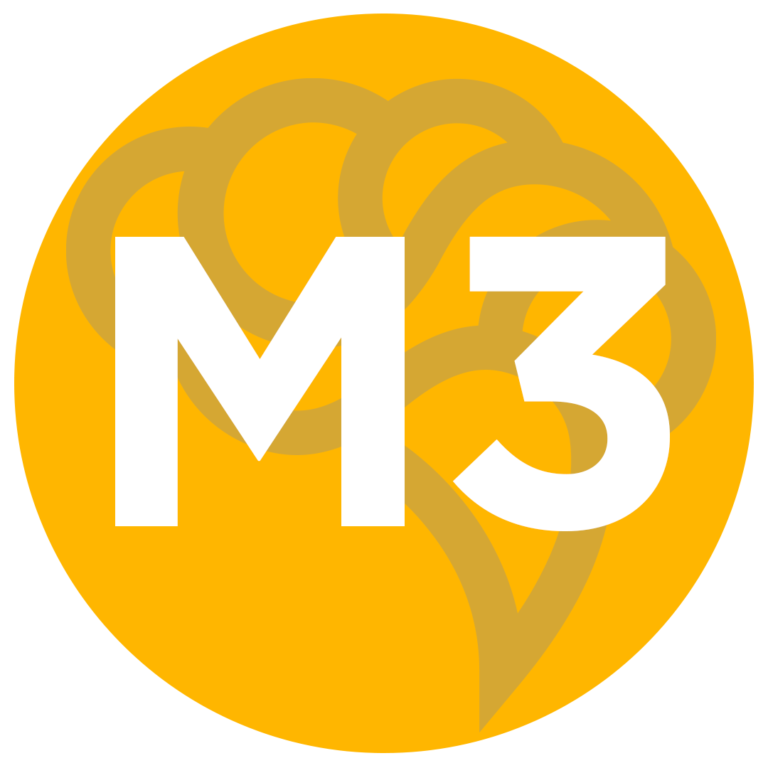
Module #3
The Job Search Process
To obtain your dream IP position, you’ll need to demonstrate your knowledge of the IP industry and how your PhD experience brings value to it. This module covers….
- IP Job Search. To transition into a PhD-level IP position from academia, you will need to explain how your experience translates to the three pillars of IP: innovation, law, and business. This module provides instructions to guide you in this effort as you progress through each stage of an IP job search.
- Key Professional Abilities. IP professionals conduct research, manage time and projects, communicate with stakeholders, and more. This module outlines theabilities needed to complete these tasks and how you already have this foundation as a PhD.
- IP Experience. While not essential for a transition into IP, PhDs and postdocs can volunteer, take courses, conduct side projects, and do internships to gain IP experience. This module explains where to look for these opportunities, which will boost your applications and enable you to try out IP while still in academia.
- IP Hiring Process. Individual law firms, companies, university technology transfer departments, and other organizations that hire IP professionals may use different processes to screen candidates. You’ll learn what employers may ask during your interviews and how they will evaluate your responses.
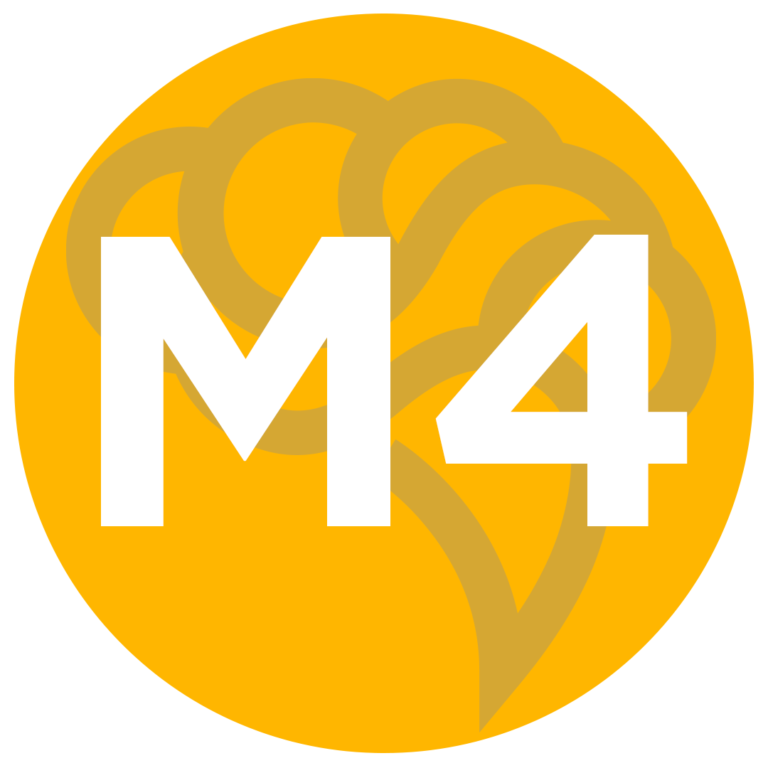
Module #4
Career Progression
PhDs in the IP industry have many horizontal and vertical career moves they can pursue to continue their professional growth. This module covers…
- 30-60-90 Day Plans. This module explains what you should do during your first 30, 60, and 90 days in an IP role to get on track for a productive and rewarding career.
- IP Career Progression In Law Firms And Universities. You’ll learn what the career ladder looks like within these organizations and what you will need to do to climb it.
- Opportunities In IP Across Sectors. IP professionals can find employment in several sectors including consultancy, private companies, the government, and nonprofits. This module outlines the options available across sectors and what they may involve.
- IP-Related Careers. IP expertise is valuable in many other industries. This module describes the most popular IP-related careers for PhDs and how IP experience is transferable to them.
As Soon As You Join The Association’s Diamond Program, You Will Also Get Immediate Access To The Following…
- A complete guide that provides practical information on the IP industry. You’ll learn what can qualify as IP, what roles are available in IP, who employs IP professionals, and more. You’ll enter the job search knowing exactly what you’re looking for and what your future employer expects from you.
- The Intellectual Property Career Library describes what you’ll experience in a typical week – from researching an invention’s patentability to strategizing with IP clients and team members. Instead of entering your interview wondering what you don’t know, you’ll be prepared to ask questions that will help you determine if you want to accept a job offer from a particular employer.
- Discover what IP sectors and organizations would best suit your PhD experience and personal interests. Gain knowledge from industry insiders that will help you make savvy decisions as you apply for an opening in IP.
- Learn the essential foundation for IP professionals. Discover how to translate your experience in knowledge synthesis, project management, and communication into strategies for obtaining IP protection for inventions.
- Detailed information on IP law so you know how to converse with IP industry professionals. You’ll understand the challenges facing every IP application. With the Intellectual Property Career Library, you’ll gain knowledge that shows a potential employer that you’ve done your homework and you’re prepared for a successful industry transition.
- The career library thoroughly explains how to obtain and protect IP rights. You’ll learn how various types of IP work, how IP is governed internationally, and how IP promotes innovation.
- Gain important insights into how each of the IP industry-specific roles is involved in protecting inventors’ rights. You’ll fully understand how your PhD is an asset for entering and advancing in IP.
- Discover how to translate your knowledge of IP into questions that will impress your future employer. The Intellectual Property Career Library provides important advice to help you showcase your knowledge and passion for the field.
- Access to a private online group: an exclusive circle of IP professionals and fellow PhDs where you can communicate about critical topics, request referrals, and ask for the input of other IP professionals. Only Cheeky Scientist members are allowed access to this group.
- Gain guidance from practicing IP professionals on your upcoming interview, your newly created resume, or your recent job offer. They’re in the field and can provide advice that’s targeted for your specific needs and questions.
- Enjoy meaningful conversations with other PhDs in the group to discuss the latest development in your job search, your current challenges, and more. Learn from PhDs who’ve made the transition and ask for referrals.
- Leverage the private group to find other IP professionals or PhDs you can connect with. Find members by their name, location, educational background, or other characteristics to aid your job search.
- The comprehensive program takes you from understanding the IP field to securing your first job. After laying a thorough foundation for your position, the Intellectual Property Career Library will cover everything from networking to giving a presentation to company leaders so you’re prepared for the hiring process.
- Over the course of four modules, you’ll enjoy information-packed workbooks, numerous videos from IP professionals, and exams to help you cement the concepts covered. Your career library is a crash course on what you need to know to improve your chances of securing a position.
- Discover effective techniques for successfully pinpointing the best companies, targeting your LinkedIn profile for IP positions, conducting informational interviews, and more. The Intellectual Property Career Library will show you how to tailor your job search for a job offer in the IP field.
- Discover the career options available to IP professionals. With the Intellectual Property Career Library, you’ll be able to look ahead into the future opportunities your new position may create.
- What you need to know about communication as an IP professional – no matter your level of extraversion. The Intellectual Property Career Library will underscore the communication techniques that will make a positive impression on your future company and will uniquely qualify you for the role.
- Gain critical insights into the qualities needed to successfully transition from your postdoc work to life as an IP professional. The Intellectual Property Career Library will show you how to showcase the abilities that will get you hired.
- Discover what hiring managers are looking for during interviews. With the Intellectual Property Career Library, you’ll get important tips for how to conduct yourself so you distinguish yourself from other candidates.
- Extensive library resources that help you learn in a variety of ways about the IP field.
- The Intellectual Property Career Library provides instant access to extensive videe from IP professionals. You’ll also gain workbooks, video transcripts, and resume templates for IP positions.
- The end of each module provides an exam to solidify the concepts you’ve learned during your PhD. The Intellectual Property Career Library will also provide monthly webinars on important topics relevant to your IP job search.
The Career Library Is NOT For You If...
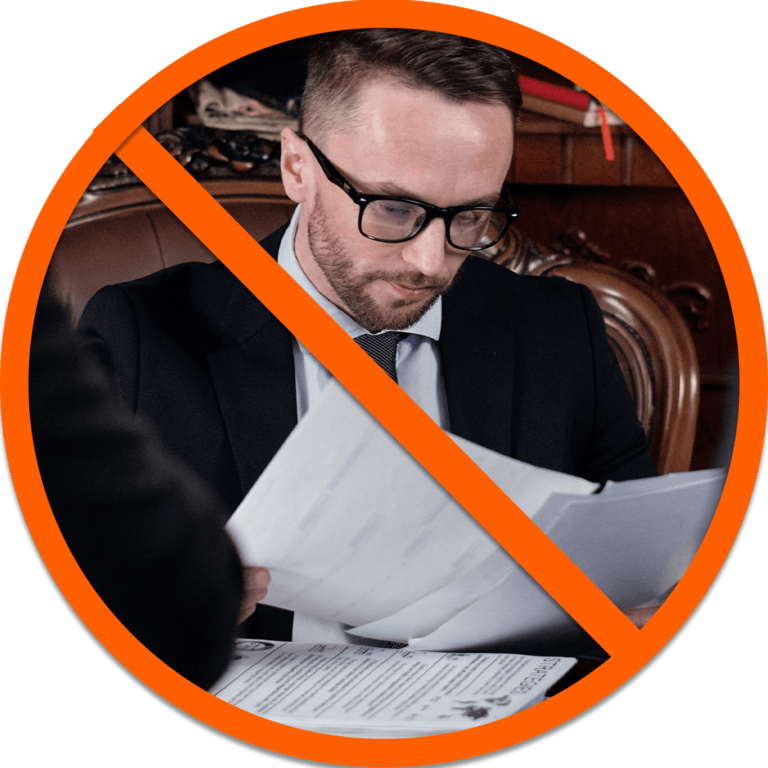
You Are Uncomfortable With Legal Paperwork
You’ve mastered the technical terminology in your PhD field of study, but you find legal documents boring and/or tedious.
IP professionals handle legal documents daily. They need to be comfortable reading, preparing, and interpreting the legal consequences of these documents
If you don’t find legal paperwork engaging, then the Intellectual Property Career Library is not for you.
The Intellectual Property Career Library is for PhDs who are inspired to work with lengthy detailed legal documents to help inventors gain IP rights and protect innovation.

You Don’t Want To Negotiate Regularly
As a PhD, you should learn to negotiate your job offers to get paid for what you’re worth.
However, not every PhD wants to negotiate daily as part of their job.
The IP industry runs on negotiations. IP professionals must consider and negotiate the interests of inventors, competitors, and the public in every IP application strategy and legal decision.
If you love innovations but find negotiations tiring, then the Intellectual Property Career Library isn’t for you.
The Intellectual Property Career Library is designed for PhDs who are enthusiastic about working with a variety of stakeholders to make reasonable and fair decisions regarding IP protection.

You Lack Writing And Communication Abilities
You’re interested in IP law. However, you aren’t interested in a writing-intensive
position.
Writing proficiency is essential for IP roles. IP professionals write and edit a variety of
documents, including patent applications and technology transfer contracts.
If you’re fascinated by the intersection of law and innovation but don’t feel like spending a significant part of your time writing, the Intellectual Property Career Library isn’t for you.
The Intellectual Property Career Library is for PhDs who appreciate the need for exceptional documentation on the
frontlines of IP law.
Get Access to the Intellectual Property Career Library & Network
If you’re determined to be an Intellectual Property Professional, and you’ve chosen the Intellectual Property Career Library to make that happen, we’d like to welcome you.
As practicing IP Professionals who oversee the Intellectual Property Career Library at Cheeky Scientist, we know firsthand the challenges you face, the questions you have, and the information you’ll need to succeed.
We’re ready to empower you to make the transition, and we hope to meet you in the private group soon.
To your success,
The Intellectual Property Professionals at Cheeky Scientist
Intellectual Property Career Library Board Members

Jo Ramos-VonRitchie, PhD
Patent Agent at US Patent & Trademark Office (USPTO)

Yu Noda, PhD
Technical Advisor at Slater Matsil

Steve Ouellette, PhD
Patent Technical Advisor at Cooley LLP

Dhara Patel, PhD
Patent Agent at Wolf Greenfield

Liuba Berekelya, PhD
Patent Engineer at University of Grenoble Alpes

Nayab, Shiraz, PhD
Patent Engineer at AI Patent Law
We help PhDs from every discipline get into many different types of careers, including Intellectual Property.
We show you how to leverage the skills you already have to get hired into a myriad of industry jobs, including Intellectual Property.
We show you how to get the job, not how to do the job because each company has their own proprietary systems and will teach you how to do the job through on-the-job training.
But, before you can get this training, you have to get hired first.
That’s where we come in.
We will guide you on how to use your PhD to get hired into Intellectual Property.
